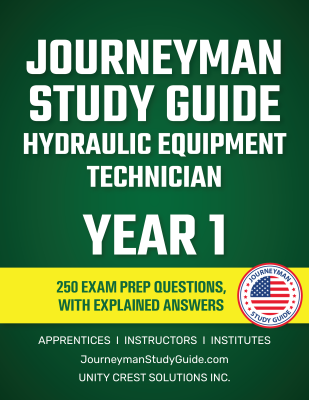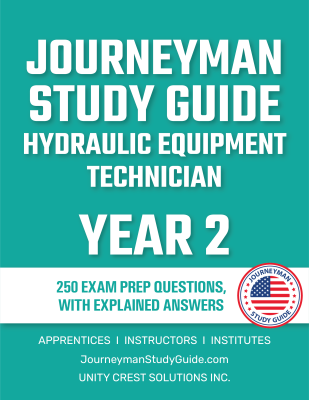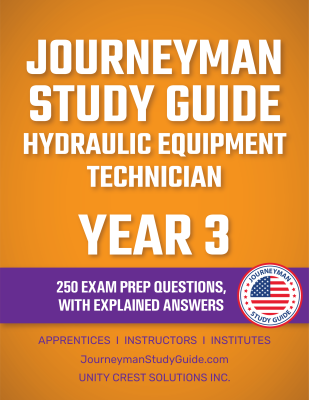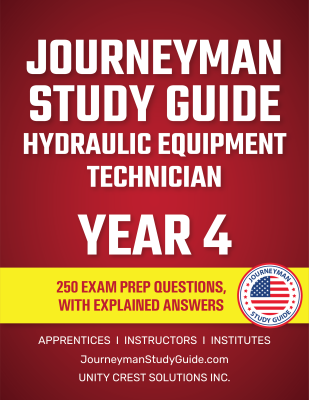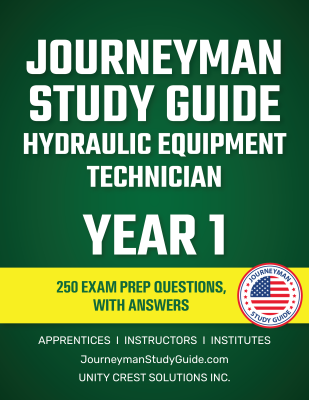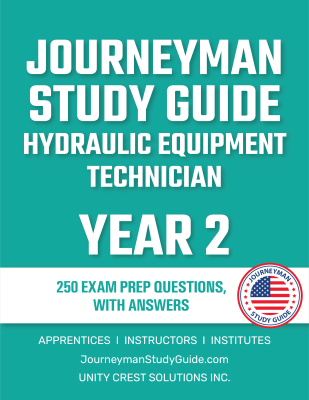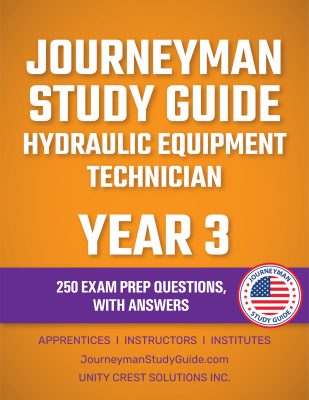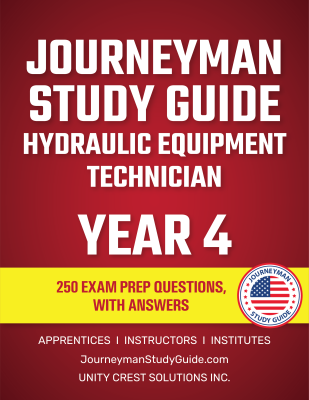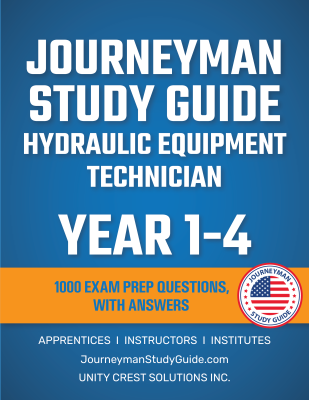Questions, Answers, & Explanations
Get clear explanations behind every answer, perfect for deeper learning and more thorough exam preparation.
Site Updates in Progress: Things might look different as we work on enhancing your experience.
What is a Hydraulic Equipment Technician?
A Hydraulic Equipment Technician is a skilled professional who works with hydraulic systems used in various machines and equipment across industries such as construction, mining, manufacturing, and transportation. Hydraulics involves using pressurized fluid to generate mechanical force, and hydraulic equipment is crucial in applications where heavy lifting, precise movement, or high force is required, such as in cranes, excavators, and agricultural machinery.
Key Responsibilities
As a Hydraulic Equipment Technician, your responsibilities may include:
Skills and Traits for Success
To succeed as a Hydraulic Equipment Technician, professionals should possess:
Industries Where Hydraulic Equipment Technicians Thrive
Hydraulic Equipment Technicians are employed in a variety of sectors that rely on heavy machinery and hydraulic systems, including:
Why Choose This Career?
Get Ready for Your Career as a Hydraulic Equipment Technician!
Prepare to launch your career as a Hydraulic Equipment Technician with our expert-designed Q&A guides, Q/A Explanations, and Online Tests. These study resources are tailored to help you master the technical skills, knowledge, and safety protocols required in this high-demand field.
What to Expect on the Certification Exam
The Hydraulic Equipment Technician certification exam evaluates an individual's technical expertise, practical knowledge, and understanding of industry standards. Certification is essential for those looking to advance in the hydraulic systems industry, as it validates their skills in maintaining, repairing, and troubleshooting hydraulic machinery.
Exam Format
The certification exam typically consists of:
Key Topics Covered
Passing Requirements
To achieve certification, candidates typically need to score at least 70% on the exam, demonstrating a basic level of competency in hydraulic system operation and maintenance. For those aiming to specialize in high-demand sectors like construction or manufacturing, earning a higher score may be beneficial, as it shows a deeper understanding of hydraulic systems and troubleshooting techniques.
Tips for Preparing Effectively
Resources for Preparation
Prepare for Your Certification Today!
Ensure success in your Hydraulic Equipment Technician certification exam with our expert-designed study guides, Q&A explanations, and online tests. These resources will help you master hydraulic systems and pass your certification exam with confidence.
What Types of Questions Are on the Certification Exam?
The certification exam for Hydraulic Equipment Technicians includes a blend of multiple-choice and practical scenario-based questions designed to test both theoretical knowledge and hands-on technical skills. The exam assesses a candidate's understanding of hydraulic systems, equipment, and troubleshooting methods.
The exam format includes:
Common Question Formats
Sample Questions
Tips for Answering Exam Questions
Practice Questions for Better Preparation
Our Q&A with Explanation guide provides an excellent way to reinforce your knowledge of hydraulic systems, troubleshooting techniques, and industry standards. It includes detailed answers to help you understand the reasoning behind each correct choice.
In addition, our Online Tests simulate the actual exam experience by providing real-time scoring and feedback. You can track your progress and focus on areas that need improvement.
Prepare for Your Certification Today!
Ensure your success on the Hydraulic Equipment Technician certification exam with our expert-designed study materials. Our Q&A guides, Q/A Explanations, and Online Tests are tailored to help you master the skills and knowledge needed to excel in this high-demand field.
Morning: Preparing for the Day
A typical day for a Hydraulic Equipment Technician begins with preparing for the tasks ahead and ensuring everything is in proper working order. Technicians typically start their day by:
Midday: Operating, Troubleshooting, and Repairing
Once the preparations are complete, the technician transitions to operating, troubleshooting, and repairing hydraulic systems. The tasks typically include:
Afternoon: Testing, Quality Control, and Documentation
After performing repairs, the technician’s day includes ensuring that the system is fully operational, safe, and up to standard. This phase involves:
Typical Work Environments
Hydraulic Equipment Technicians can work in a wide range of industries that rely on hydraulic systems for their operations. Some common environments include:
Challenges and Rewards
Working as a Hydraulic Equipment Technician comes with both challenges and rewards.
Challenges:
Rewards:
Ready to Start Your Career as a Hydraulic Equipment Technician?
Advance your skills and prepare for certification with our Q&A guides, Q/A Explanations, and Online Tests designed to help you excel as a Hydraulic Equipment Technician.
Earning Potential
Salaries for Hydraulic Equipment Technicians can vary depending on experience, expertise, and the specific industry in which they work. As the demand for skilled technicians in sectors like construction, oil and gas, and manufacturing grows, the earning potential in this field is substantial.
Regional Salary Differences
Salaries for hydraulic technicians also depend on geographical location, with certain regions offering higher wages due to demand and cost of living.
Career Growth Opportunities
The career path for a Hydraulic Equipment Technician is both diverse and rewarding. As technicians gain experience and additional certifications, there are numerous opportunities for advancement.
The Benefits of Certification
Certification is a valuable asset for Hydraulic Equipment Technicians, offering numerous advantages:
Success Stories
Advance Your Career in Hydraulic Equipment Today!
Hydraulic Equipment Technicians play a critical role in maintaining and repairing complex systems across various industries. Enhance your career prospects and earning potential with our expert-designed study guides, detailed Q&A explanations, and interactive online tests to prepare you for certification exams.
General Wage Ranges
Salaries for Hydraulic Equipment Technicians can vary based on factors such as geographic location, experience level, industry specialization, and job responsibilities. Here are the typical salary ranges for hydraulic technicians in the U.S.:
Regional Salary Differences
West Coast (CA, WA)
High demand in aerospace, tech, and construction boosts wages to $60,000–$85,000, especially in cities like San Francisco and Los Angeles.
Midwest (IL, OH, MI)
Automotive giants like Ford and GM drive demand, with salaries around $55,000–$75,000, rising with specialization.
Southern States (TX, LA, AL)
Oil and gas hubs like Houston and Dallas offer $60,000–$85,000, especially for roles in drilling and machinery.
Northeast (NY, MA)
Medical and heavy machinery sectors offer $55,000–$75,000, with higher pay in specialized military or medical work.
Factors That Impact Wages
Several factors affect the wages of Hydraulic Equipment Technicians:
Earnings by Industry
Different industries have varying demands for hydraulic technicians, and the wages are often tailored to the level of expertise required:
Opportunities for Wage Growth
Wages for hydraulic technicians tend to increase with additional training, certifications, and expertise in niche areas. Ways to increase earning potential include:
Boost Your Earning Potential in Hydraulic Equipment Technology!
Ensure your career success with our Q&A guides, Q/A Explanations, and Online Tests. These tools are designed to help you excel in certification exams and maximize your career earnings in the hydraulic equipment industry.
Essential Tools for Technicians
To succeed in the field of hydraulic equipment maintenance and repair, technicians rely on a variety of specialized tools and equipment to ensure that systems are functioning optimally. Here are the essential tools and resources needed to perform the job effectively:
Recommended Learning Resources
To stay current in the hydraulic field, it’s essential to use various learning resources, including courses and certifications from reputable institutions and organizations:
Suppliers and Material Resources
When it comes to sourcing parts and equipment, technicians must rely on reliable suppliers that provide high-quality components and materials for hydraulic systems:
Tips for Building Your Toolkit on a Budget
Building a professional toolkit for hydraulic system maintenance doesn’t have to be expensive. Here are some tips for obtaining the necessary tools without breaking the bank:
Why the Right Tools Matter
Using the right tools ensures that hydraulic systems are repaired, maintained, and operated safely and efficiently. A technician’s toolkit directly impacts the quality of their work and the longevity of the equipment they service. Investing in high-quality tools, such as diagnostic equipment from Fluke or a pressure tester from Snap-On, ensures precision in repairs and provides the technician with a competitive edge in the industry.
Stay Ahead in Hydraulic Equipment Technology!
Ensure success in your career by preparing for certification with our Q&A guides, Q/A Explanations, and Online Tests. These resources are designed to help you enhance your skills and stay ahead in this growing field.
Where to Learn Hydraulic Equipment Technology
To become a skilled Hydraulic Equipment Technician, specialized training is essential. Across the U.S., many reputable institutions offer programs designed to teach the fundamentals of hydraulics, fluid power systems, and machinery maintenance. Here are some of the top institutions and programs for hydraulic technician training:
Types of Education Programs
Hydraulic Equipment Technician training comes in a variety of formats to cater to different learning styles and career goals. The most common programs include:
What to Expect in a Training Program
Students enrolled in hydraulic technician programs can expect a mix of theoretical knowledge and hands-on practical experience. Training covers the following key areas:
How to Choose the Right Program
Choosing the right education program is crucial to your success as a Hydraulic Equipment Technician. Consider the following factors when selecting a program:
Featured Institutions
Ready to Advance Your Skills?
Take the next step in your career as a Hydraulic Equipment Technician. Our expert-designed study guides, Q/A Explanations, and Online Tests will help you gain the necessary skills to pass certification exams and excel in the hydraulic industry.
Why Join a Union or Connect with Employers?
Joining a union or working with reputable employers provides hydraulic equipment technicians with job security, competitive wages, and career growth opportunities. The demand for skilled hydraulic professionals in sectors such as construction, oil & gas, aerospace, and manufacturing has led to increasing representation through trade unions and structured employment programs.
Benefits of Joining a Union
1. Higher Wages & Benefits
Union members typically earn higher wages compared to non-unionized workers, as unions negotiate better pay rates for their members. In addition to higher wages, union members often receive valuable benefits such as health insurance, retirement plans, and paid leave. Membership in unions like the United Steelworkers (USW) or International Union of Operating Engineers (IUOE) often means access to better pay and more comprehensive benefits.
2. Job Security
Being part of a strong union provides technicians with job security. Unions protect workers from unfair treatment, offer assistance in resolving workplace disputes, and advocate for safe working conditions. With the ongoing need for skilled hydraulic technicians, union membership can help ensure consistent work opportunities, particularly in industries like oil & gas, construction, and manufacturing.
3. Advanced Training
Unions often offer specialized training programs and workshops that focus on the latest advancements in hydraulic technologies and industry best practices. By participating in these programs, technicians can stay updated on new hydraulic systems, diagnostic tools, and troubleshooting techniques. For example, the International Brotherhood of Electrical Workers (IBEW) offers training in high-tech manufacturing and hydraulic systems.
4. Career Advocacy
Unions advocate for their members, ensuring fair wages and safe working conditions. Technicians who belong to unions like USW or IUOE receive representation in labor disputes and assistance with job placement. This support can be crucial in securing long-term, stable employment in industries where safety and efficiency are critical, such as aerospace or energy.
Top Unions for Hydraulic Equipment Technicians
Connecting with Employers
Finding the right employer is crucial to career success as a hydraulic technician. Many leading companies in oil & gas, aerospace, construction, and agriculture actively seek skilled hydraulic professionals to maintain and repair their hydraulic systems. Some of the top employers include:
Tips for Finding Work
1. Network Through Industry Events
Attending industry events such as the Hydraulic Institute’s Annual Conference or National Fluid Power Association (NFPA) conferences can help you network with top employers in hydraulic technology. These events allow you to meet potential employers, learn about the latest industry trends, and explore career opportunities.
2. Earn Recognized Certifications
Employers prioritize candidates with certifications from reputable organizations. NCCER (National Center for Construction Education and Research) and IFPS (International Fluid Power Society) offer certifications that can enhance your resume and make you more competitive in the job market. These credentials prove your expertise and readiness to work with complex hydraulic systems.
3. Leverage Union Membership
Many unions, such as the International Union of Operating Engineers (IUOE), offer job placement assistance and apprenticeship programs for hydraulic technicians. These programs connect workers with employers who need skilled technicians for ongoing and future projects. Union members also have access to continuous learning resources and workshops.
4. Seek Specialized Training
Completing training programs provided by manufacturers like Caterpillar and Parker Hannifin gives you the edge in landing a job. Many employers require technicians who are familiar with specific brands and systems. Specialized training in high-pressure hydraulic systems or mobile equipment hydraulics can set you apart from other candidates.
Start Your Career as a Hydraulic Equipment Technician Today!
With the right skills and certifications, you can advance your career in hydraulic equipment technology. Our expert-designed study guides, Q/A Explanations, and Online Tests will help you prepare for certification and boost your career prospects in the growing hydraulic field.
The hydraulic equipment technician industry continues to evolve with the growth of new technologies, advancements in machinery, and innovations in fluid power systems. To stay competitive, technicians need to embrace continuous learning, seek certifications, and keep up with emerging trends in hydraulic technology. Those who commit to staying ahead will find the best career opportunities and gain a competitive edge in this growing field.
Emerging Trends in Hydraulic Equipment Technology
Best Practices for Professional Growth
To ensure long-term success as a hydraulic equipment technician, consider these best practices:
Challenges and Opportunities
Like any industry, hydraulic equipment technicians face challenges, but these challenges often bring new opportunities:
Challenges
Opportunities
Sustainability in Practice
Hydraulic technicians play a key role in advancing sustainability in the industry:
Why Staying Ahead Matters
The hydraulic equipment technician industry is ever-changing, and staying ahead of new technologies and trends ensures that technicians can remain valuable and competitive. Those who embrace continuous learning, pursue specialized certifications, and stay informed about sustainability practices will be best positioned for success.
Stay Competitive in Hydraulic Equipment Technology!
Ensure your career success with our expert-designed study guides, Q/A Explanations, and Online Tests, designed to help you gain the necessary skills and knowledge to pass certification exams and excel in the hydraulic industry.
Get clear explanations behind every answer, perfect for deeper learning and more thorough exam preparation.
Quick and easy practice to test your knowledge anytime, anywhere—ideal for simple, on-the-go preparation.

